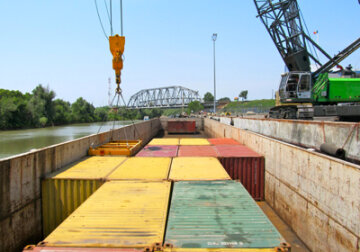
Moldova's strategic Giurgiulesti port has doubled its cargo transshipment, becoming a lifeline for Ukraine and part of the solution to the regional problem of food security - EBRD.
This is written by the European Bank for Reconstruction and Development, which is the sole ultimate owner of Danube Logistics group of companies - the general investor and operator of Giurgiulesti port, the main river port of Moldova with access to the sea. The river-sea port located at the confluence of the Danube and Prut rivers, which gave the tiny landlocked country of Moldova in southeast Europe its only commercial access to international waters, is now serving a second vital function, according to the EBRD. Since Russia blocked ports on Ukraine's Black Sea coast this spring, the port of Giurgiulesti has also helped deliver grain and fuel to and from neighboring Ukraine. "Today, not only does Giurgiulesti port safeguard supply chains for Moldovan importers and exporters, but since the start of the war on Ukraine it has also played a key role in helping to uphold supplies to and from Ukraine," said EBRD Vice President Alain Pilloux, who will visit the port in late July. The EBRD, which has been an investor in the port since its inception, also became the sole ultimate legal owner of port operator Danube Logistics on May 18, 2021. Since Russia and Ukraine together typically supply about 30% of the world's grain, meaning that global food security is threatened after February 24, other ways are being sought to export agricultural products from Ukraine to the world and import supplies to make its economy work as normally as possible. Among the possibilities being explored are the use of rail and road transport through Europe, as well as the Danube, Europe's second-longest river, which runs through much of Central and Southeastern Europe. This year's Giurgiulesti Port figures show how useful the Danube option is, even if all the solutions are small compared to the scale of the food security problem. According to port operator Danube Logistics, overall annual volumes passing through the port more than doubled in 2022, reaching 804029 tons. This is mainly due to increased imports of petroleum products, coal and fertilizers and exports of grain and vegetable oil. Existing grain handling and storage facilities are increasingly being used for grain of Ukrainian origin. "The port is both a main point of entry for fuel imports to Moldova and a supplier of fuel to Ukrainian petrol station networks and farmers. While a major objective is exporting cereals from Moldova, Giurgiulesti increasingly tranships grains from Ukraine, contributing to the international effort to avert the food shortages threatened by the war," said Angela Sax, head of the EBRD office in Moldova. "Within the impressive overall trade volumes for 2022, the port operator’s detailed figures speak of benefits for all concerned, with extra staff being taken on, further investments speeded up, and tariffs for clients being kept at stable levels as both Moldovan and Ukrainian economies benefit," said Danube Logistics CEO Matthias von Tucher. According to him, for example, in 2021 in Giurgiulesti the average volume of oil products transshipment was 34,000 tons per month. But by May 2022, that figure had risen to 65,000 tons, more than half of which was estimated to be destined for onward shipment to Ukraine. Similarly, grain and vegetable exports were at high levels in 2022 - 309,404 tons and 99,694 tons, respectively - with grain handling and storage facilities increasingly being used for grain from Ukraine. According to von Tucher, transshipment of other cargo groups, such as coal and fertilizer imports, has resumed after alternative import sources and routes through Ukraine were shut down. The existing general cargo terminal is fully utilized, and the company is in the final stages of designing a new universal stand. The new $5 million terminal will mainly be used for bulk and general cargo, and is scheduled to open in the second half of 2023. Finally, von Tucher says the port is preparing to resume container transshipment from the Romanian port of Constanta to Moldova and Ukraine. The company has developed a new 5,000-square-meter container handling and storage platform, which could be further expanded depending on demand growth. The port plans to purchase additional loading and unloading equipment to meet demand in this area. Von Tucher says additional staff has been hired to meet the increased demand, and the port is going to purchase additional equipment. In total, port residents have made more than $100 million in investments, which only accelerates an already steady trend, showing how the port is supporting the Moldovan economy. According to the Ministry of Economy, the port already employed 553 people at the end of 2021, a 7 percent increase over 2020. Wages are up 22%, investment is up 43.5%, transshipment is up 52.4%, and tax payments are up 149%. Other nearby ports operating under different wartime conditions may have recently raised their transshipment rates or charged different levels to customers of different nationalities. But the Port of Giurgiulesti has kept its rates relatively stable, reflecting its long-term relationship with customers. // 08.07.2022 - InfoMarket







